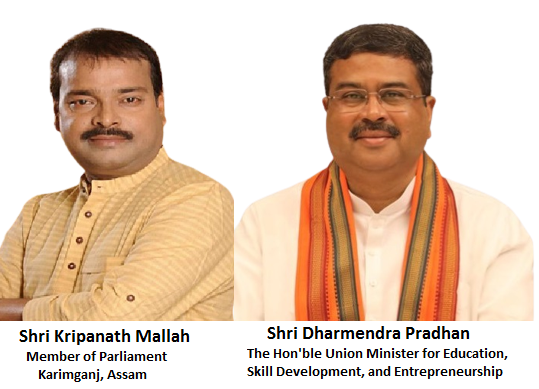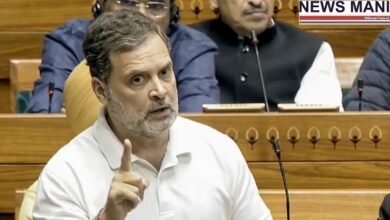Address the Mental Health and ‘Free Entry-Exit Policy’ in Central Institutions: Appeal from MP Kripanath Mallah

In a heartfelt appeal, Kripanath Mallah, Member of Parliament from Karimganj, Assam, has drawn attention to a tragic incident that unfolded at the National Institute of Technology (NIT) in Silchar, Assam. This incident, which resulted in the unfortunate suicide of a student, has sparked widespread protests by the student community and the public. Mallah’s letter to Shri Dharmendra Pradhan, the Hon’ble Union Minister for Education, Skill Development, and Entrepreneurship, emphasizes the urgent need for the implementation of the ‘Free Entry-Exit Policy’ outlined in the National Education Policy (NEP) at central institutions like NIT Silchar.

The heart-wrenching incident involving the suicide of a 5th-semester student, Koch Buker, at NIT Silchar has shaken the academic community and the residents of Barak Valley. The protests that followed were a clear expression of the student community’s distress and dissatisfaction with the NIT’s handling of academic issues, particularly related to mental health concerns.
MP Kripanath Mallah, who represents the constituency where NIT Silchar is located, has taken up the cause of the grieving student community and the concerned public. In his letter to Shri Dharmendra Pradhan, he underscores the urgent need for appropriate action to address the grievances and restore confidence in the institution.
Mallah’s letter to Minister Pradhan brings attention to an essential aspect of the National Education Policy (NEP) 2020, a visionary policy guided by Prime Minister Sri Narendra Modi Ji’s leadership. The NEP introduces the concept of a ‘Free Entry & Exit Policy’ for undergraduate courses, which offers students flexibility and choices in their academic journey.
The NEP 2020 states: “The undergraduate degree will be of either 3 or 4-year duration, with multiple exit options within this period, with appropriate certifications, e.g., a certificate after completing 1 year in a discipline or field, including vocational and professional areas, or a diploma after 2 years of study, or a Bachelor’s degree after a 3-year program.”

MP Kripanath Mallah’s letter underscores the pressing need for central government-run professional institutions, such as NIT Silchar, to swiftly implement the ‘Free Entry-Exit’ policy outlined in the NEP. This policy allows students to make informed choices about their academic journey and provides them with the flexibility to exit a course if they find it challenging or unsuitable.
By adopting this policy promptly, central institutions can help prevent future incidents like the tragic suicide of Koch Buker, which was seemingly linked to academic pressures and mental health struggles. MP Mallah’s appeal is rooted in the belief that implementing the ‘Free Entry-Exit Policy’ will contribute to eradicating instances of student suicides due to mental health issues within the educational sector.
In his letter, MP Kripanath Mallah expresses his gratitude to Minister Pradhan for his exceptional leadership in the implementation and popularization of the NEP across the nation. The NEP represents a visionary roadmap for transforming India’s education system, and its success hinges on the committed efforts of leaders like Minister Pradhan.
MP Mallah’s letter concludes with a heartfelt plea for Minister Pradhan’s immediate intervention with the authorities of NIT Silchar. He calls for appropriate action to address the concerns of the protesting students and the people of Barak Valley in Assam. This appeal reflects the urgency of the situation and the need for timely measures to restore faith in the educational system and prevent future tragedies.
MP Kripanath Mallah’s impassioned appeal to Union Minister Dharmendra Pradhan serves as a poignant reminder of the critical importance of addressing mental health concerns within the academic community. It also underscores the need for the swift implementation of the ‘Free Entry-Exit Policy’ outlined in the NEP to provide students with flexibility and choices in their educational journey.
As India continues to make strides in transforming its education system, it is crucial that the well-being and mental health of students remain a top priority. MP Mallah’s letter represents a call to action and a plea for change, emphasizing that the educational sector must evolve to safeguard the mental and emotional health of its students while nurturing their academic aspirations.
News Mania Desk / Agnibeena Ghosh 26th September 2023






